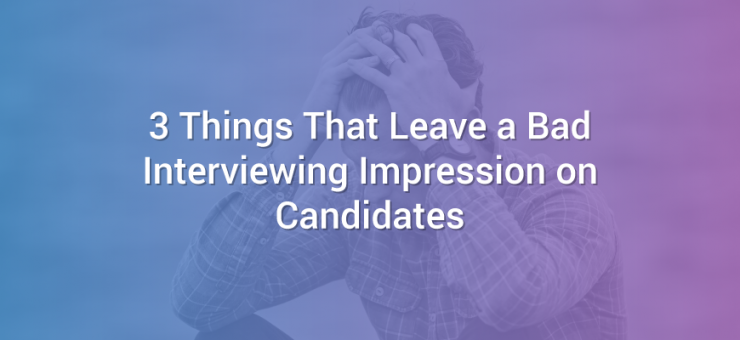While interviewing can be extremely stressful for candidates, there’s a large amount of pressure on the interviewers themselves. So, have you ever wondered why many of your interviews don’t seem to end with a hire? If you, as the interviewer, leave a bad impression on your candidate, you could miss out on a potential asset to your organization. Anything from the questions you’re asking to the work environment itself can rub candidates the wrong way.
Take into consideration some of these mistakes you might be making during your interviews and make the necessary adjustments to start leaving better impressions on your candidates.
1. Your appearance is interfering
Much of the impression we leave on others is attributed to the way we look. In fact, studies show that 55% of the first impression we develop about someone is drawn from their physical appearance. While we often compel candidates to look their best, it’s equally important for interviewers to look professional as well, and the way you look could be part of the reason your applicants take their talents elsewhere.
Small aspects of your appearance could serve as a distraction for your interviewee, so put a little extra effort into your look while preparing for interviews. A tailored suit and tie or a classy dress are important for exuding professionalism and look best with hard-earned, consistent self-care. Presenting yourself professionally means having confidence in your appearance. If you’re self-conscious of easily-controlled problems like acne, male pattern baldness, or inconsistent complexion small grooming efforts can go a long way in making you feel and look professional, respected, and trustworthy to others. In addition, a clean, sophisticated look will not only prevent any visual distractions for your candidate, but also represent how you value your career and the interviewee’s time.
2. You’re not making them feel welcome
Candidates also develop an opinion early on about the work environment and whether or not they will feel comfortable. If the workplace is not inviting, either due to the people or the infrastructure of the office, applicants will likely be very quickly turned off. There’s a chance you aren’t giving enough thought to what your applicants are walking into.
Besides making sure the workplace is simply clean and organized, presenting snacks or beverages to newcomers as they arrive will make your office more inviting. You should also encourage existing employees to introduce themselves and welcome interviewees. The location of the interview can also affect their relaxation, so comfortable chairs, proper temperatures, and a well-lit room are necessities in a welcoming office space. Make a point to continue the friendliness yourself before settling into the interview; smile, introduce yourself, and ask the candidate about themselves. Remember, first impressions can make or break the interview, so work hard to make candidates feel like they fit in as soon as they arrive.
3. You’re asking the wrong questions
Once the interview gets started, you might encounter some awkward silences, or find that the dialogue isn’t getting anywhere. Though you might initially blame that on your candidate, the questions you’re asking, or the way in which you’re asking them, it could be one of the common interviewing communication mistakes preventing you from finding the right people for the desired position. If you’re doing the majority of the talking, or not letting them display their personality, they could leave the interview with a negative perception of your company.
Good interview questions should not only be relevant to the job requirements, but also allow the subject to think outside the box. Ask open-ended questions that give candidates the opportunity to share their unique perspective and experiences. Include situational questions as well because they indicate typical behavior and decision-making qualities while allowing the candidate to be more creative. Asking these questions in the interview allows you to develop a better understanding of the applicant, discover their skillset, and determine if they’re a good fit for the job.
Take the time to make a connection with interviewees so that they feel comfortable and confident throughout the meeting. When candidates feel at ease, they’ll be able to effectively answer your questions and show off their employability. Cut back on your interviewing mistakes to create better first impressions and you’ll see more successful interviews.











